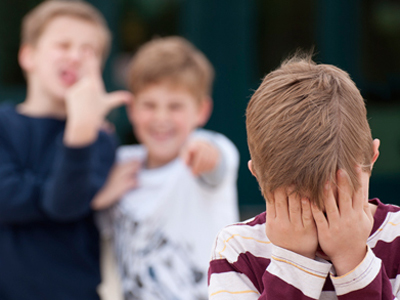How can I Protect my Child from Bullying and Cyberbullying?
Bullying and cyberbullying should always be taken seriously. To help to protect your child, first of all, you should watch out for warning signs. If you spot any then talk to them and see if you can get them to confide in you

Protecting Your Child from Bullying
Regrettably, many children fall victim to either school bullying or cyberbullying. They might face ridicule for taking education seriously or having supportive parents, which some peers may perceive as 'uncool'. Bullying demands serious attention. Here are tips and guidance for parents to safeguard their children from bullying.
LEARN ABOUT THE BENEFITS OF LEARNING THROUGH QUIZZES
Understanding Why Children are Bullied
Children often face pressure to conform with their peers. Any differences, whether in appearance, race, ability, or attitude, can make them potential targets for bullying. Schools must have proper procedures to prevent and address bullying, and children should be resilient enough to seek help when needed.
In 2015, the NSPCC conducted 26,000 counselling sessions for young victims of bullying. The pervasive influence of technology and smartphones means that bullying can reach children even in the supposed safety of their homes, leaving them fearful, depressed, and isolated.
Defining Bullying
Bullying encompasses physical abuse, violence, intimidation, threatening behaviour, taunting, verbal name-calling, and more insidiously, coercion, isolation, humiliation, or exploitation of insecurities.
Raising Awareness About Bullying
Even if your child isn't currently facing bullying, discussing the issue is crucial. Explain that bullying is unacceptable, and if they ever feel mistreated or witness others suffering, they should promptly report it.
Recognizing the Signs of Bullying
Recognizing signs early is vital, as some children may be reluctant to speak out. Changes in character, behaviour, mood, or attitude, along with physical signs like unexplained bruises, can indicate bullying. Encourage open communication and reassure your child that it's not their fault if they are being bullied.
Dealing with Bullying
If your child is being bullied, schools have anti-bullying policies and take the issue seriously. Address the bully promptly, involve the school, and, if necessary, contact the police. Encourage your child to spend time with supportive friends or family while authorities handle the situation.
If Your Child is a Bully
If you discover that your child is a bully, address their behaviour by educating them about its impact on others. Contact the school if necessary and seek professional advice.
FIND OUT WHY KIDS LOVE OUR WEBSITE
Understanding Cyberbullying
Cyberbullying, occurring over the internet or via text messages, is a growing concern. Easy access to social media and mobile devices means it can happen anywhere, anytime.
Spotting Signs of Cyberbullying
Recognizing signs of cyberbullying can be challenging, but changes in mood after online activities or increased online and mobile phone use may indicate a problem.
Protecting Your Child Online

- Set clear rules and boundaries and use parental controls on devices.
- Educate children on internet safety, encouraging them to accept friends they know, keep personal information private, and report concerns.
- Suggest monitoring their social media activity or ask them to accept a trusted adult as a friend.
- Encourage open communication about online experiences.
- Help them document evidence of cyberbullying, such as taking screenshots and saving text messages.
- Block and report bullies to the website provider.
- Contact your child's mobile phone network to change their number if necessary.
- If bullies are classmates, inform the school.
- If the issue persists, involve the police.
How to Tell if Your Child is a Victim of Cyberbullying
It can be difficult spotting the signs of cyberbullying, but if you notice that your child is sad or upset after spending time online, or you notice any social changes – unusual or increased activity online or on their mobile phone, or if you see unknown numbers contacting them – these might be signs.
How to Protect Your Child from Cyberbullying
- Set clear rules and boundaries and place parental controls on devices
- Educate children on internet safety. Advise them to only accept people they know as friends, keep personal information and location private, and talk to you if they feel worried
- You could suggest that they accept you or an older sibling as a social media friend, to watch over them (but expect them to say, ‘No way!’)
- Encourage your child to talk to you if they feel threatened, upset, or humiliated
- Help them to log any evidence of cyberbullying (take screenshots of conversations and save text messages)
- Block any bullies and report incidents to the website provider
- Contact your child’s mobile phone network to change their telephone number
- If the bullies are fellow pupils, contact the school
- If serious, or persistent after you have taken other measures, contact the police
So, in answer to the question, ‘How can I protect my child from bullying and cyberbullying?’ there are quite a few things you can do. Firstly, explain that bullying can happen to anyone. It is not their fault, but the bully’s. Even the bully has probably been bullied themselves, causing them to lack empathy so we should pity them. Bullying is distressing for everyone. Communication is vital. Educate children about bullying so they are able to recognise if it happens to them or others. Reassure them that they can trust you and all will be well. Make sure they know that you will protect and support them, and can make the bullying stop. Last but not least, there is help and support for your child – and for you. Do use it.
The Education Quizzes Knowledge Bank is a resource that endeavours to answer your parenting questions. As well as tips and advice on raising safe and happy children, you’ll also find a host of articles devoted to education. If there’s anything about schooling that you don’t understand, the answer might be one click away!



